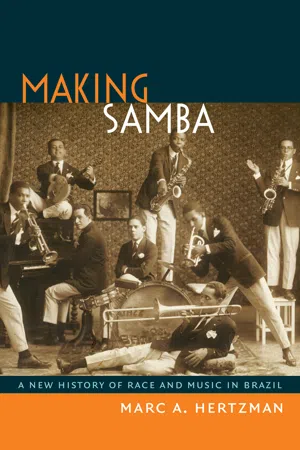
- English
- PDF
- Available on iOS & Android
eBook - PDF
About this book
In November 1916, a young Afro-Brazilian musician named Donga registered sheet music for the song "Pelo telefone" ("On the Telephone") at the National Library in Rio de Janeiro. This apparently simple act—claiming ownership of a musical composition—set in motion a series of events that would shake Brazil's cultural landscape. Before the debut of "Pelo telephone," samba was a somewhat obscure term, but by the late 1920s, the wildly popular song had helped to make it synonymous with Brazilian national music.
The success of "Pelo telephone" embroiled Donga in controversy. A group of musicians claimed that he had stolen their work, and a prominent journalist accused him of selling out his people in pursuit of profit and fame. Within this single episode are many of the concerns that animate Making Samba, including intellectual property claims, the Brazilian state, popular music, race, gender, national identity, and the history of Afro-Brazilians in Rio de Janeiro. By tracing the careers of Rio's pioneering black musicians from the late nineteenth century until the 1970s, Marc A. Hertzman revises the histories of samba and of Brazilian national culture.
Frequently asked questions
Yes, you can cancel anytime from the Subscription tab in your account settings on the Perlego website. Your subscription will stay active until the end of your current billing period. Learn how to cancel your subscription.
No, books cannot be downloaded as external files, such as PDFs, for use outside of Perlego. However, you can download books within the Perlego app for offline reading on mobile or tablet. Learn more here.
Perlego offers two plans: Essential and Complete
- Essential is ideal for learners and professionals who enjoy exploring a wide range of subjects. Access the Essential Library with 800,000+ trusted titles and best-sellers across business, personal growth, and the humanities. Includes unlimited reading time and Standard Read Aloud voice.
- Complete: Perfect for advanced learners and researchers needing full, unrestricted access. Unlock 1.4M+ books across hundreds of subjects, including academic and specialized titles. The Complete Plan also includes advanced features like Premium Read Aloud and Research Assistant.
We are an online textbook subscription service, where you can get access to an entire online library for less than the price of a single book per month. With over 1 million books across 1000+ topics, we’ve got you covered! Learn more here.
Look out for the read-aloud symbol on your next book to see if you can listen to it. The read-aloud tool reads text aloud for you, highlighting the text as it is being read. You can pause it, speed it up and slow it down. Learn more here.
Yes! You can use the Perlego app on both iOS or Android devices to read anytime, anywhere — even offline. Perfect for commutes or when you’re on the go.
Please note we cannot support devices running on iOS 13 and Android 7 or earlier. Learn more about using the app.
Please note we cannot support devices running on iOS 13 and Android 7 or earlier. Learn more about using the app.
Yes, you can access Making Samba by Marc A Hertzman in PDF and/or ePUB format, as well as other popular books in History & Latin American & Caribbean History. We have over one million books available in our catalogue for you to explore.
Information
Publisher
Duke University Press BooksYear
2013Print ISBN
9780822354307, 9780822354154eBook ISBN
9780822391906Table of contents
- Contents
- A Note about Brazilian Terminology, Currency, and Orthography
- Abbreviations
- Acknowledgments
- Introduction
- One. Between Fascination and Fear: Musicians’ Worlds in Nineteenth-Century Rio de Janeiro
- Two. Beyond the Punishment Paradigm: Popular Entertainment and Social Control after Abolition
- Three. Musicians Outside the Circle: Race, Wealth, and Property in Fred Figner’s Music Market
- Four. “Our Music”: “Pelo telefone,” the Oito Batutas, and the Rise of “Samba”
- Five. Mediators and Competitors: Musicians, Journalists, and the Roda do Samba
- Six. Bodies and Minds: Mapping Africa and Brazil during the Golden Age
- Seven. Alliances and Limits: The SBAT and the Rise of the Entertainment Class
- Eight. Everywhere and Nowhere: The UBC and the Consolidation of Racial and Gendered Difference
- Nine. After the Golden Age: Reinvention and Political Change
- Conclusion
- Notes
- Bibliography
- Index
- Photo Gallery